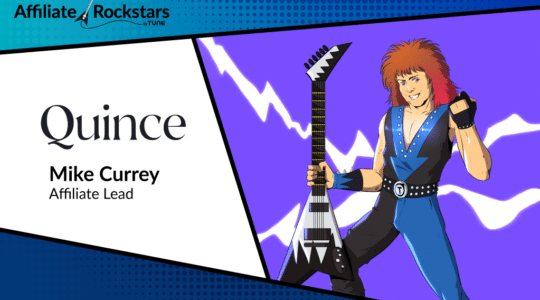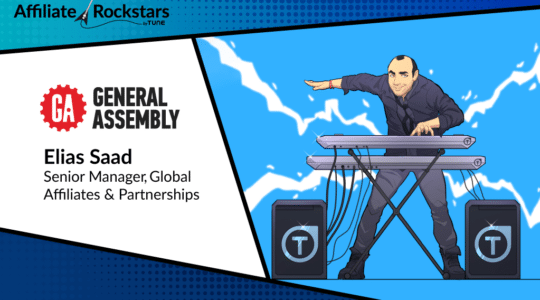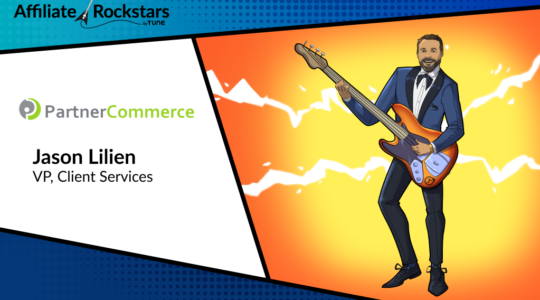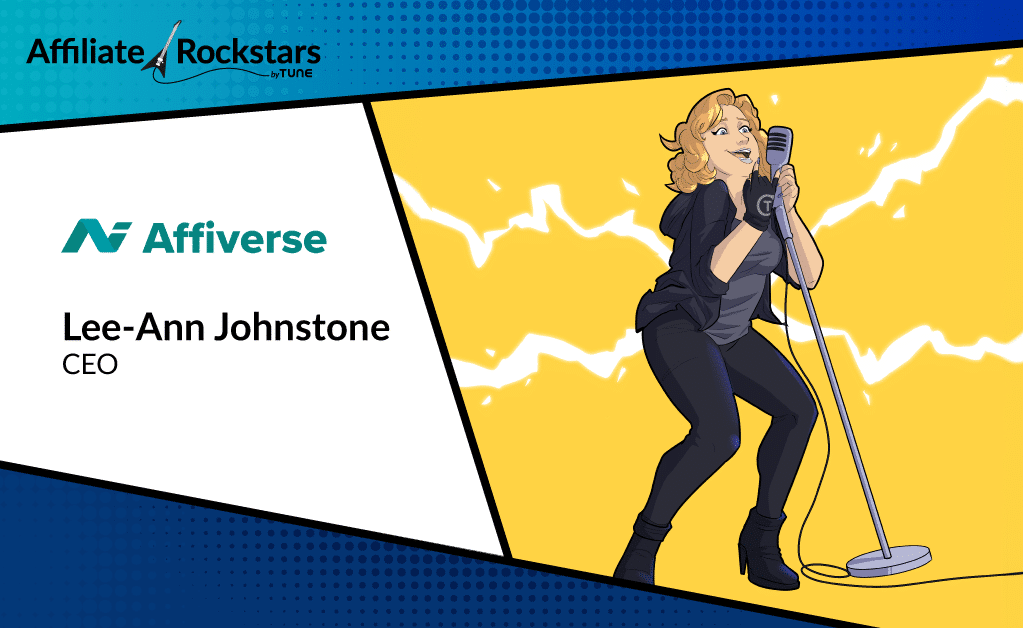
Introducing Lee-Ann Johnstone
Lee-Ann Johnstone started her career in the digital realm when dial-up modems were the fastest way to connect to the internet. Since then, she’s worked her way up from media buying to founding and running her own affiliate marketing agency, media, and training business. In addition to building global performance marketing programs and mentoring start-ups, Lee-Ann focuses on teaching new affiliate managers through a variety of mediums, including a 12-week training course and regular columns in industry outlets.
Now get ready to rock and roll with the CEO of Affiverse — take it away, Lee-Ann!
Rockstar Q&A with Lee-Ann
What are your day-to-day duties?
As the founder of Affiverse — I have a varied role because I straddle three businesses that operate in one. Primarily we are first and foremost a specialist affiliate marketing agency helping a variety of clients to launch, scale and grow their affiliate programs. However — we’re also a media, training and events company offering everyone in our community daily insights, access to expertise from around the industry on our podcast, content hub and newsletters.
We also host large virtual learning summits (AMPLIFY and ELEVATE), which offer in-depth learning with a cross section of industry veterans, which we livestream around the world to thousands of practitioners working within affiliate marketing. Our exclusive 12-week MasterMind for Affiliate Program Managers is our flagship training program, which more than 120 affiliate managers have completed from a wide variety of sectors. Through all of this, we offer training, support and services to deliver our mission: To help the world do affiliate marketing, better!
How did you get into the affiliate industry?
I fell into affiliate marketing quite by accident. About 20 years ago I was curious about marketing and the internet. I packed up my job as head of marketing for a financial services company and started my career all over again as an online media buyer, and then graduated into performance marketing and just stayed. Two decades later, here I am, still loving everything I’m learning and marveling at how big this industry has become. As a career choice — this was one of the best I made, and I have been fortunate enough to have some amazing mentors and teachers, but now I am working to pass all that knowledge forward to the next generation of digital marketers and trailblazers who are joining us at this exciting time.
What are your most important KPIs?
Depends on what you’re asking the KPIs about.
For affiliate programs: Clicks, sales, revenue — these are the things I look at all the time. Also keeping a check on the health of the relationships we’re forming with partners in programs that are scaling. It’s important to take some time to “talk” with your partners in person, and not just via Skype or email. I like to keep regular check-ins, as relationships really matter in this industry and form the foundations of success.
For myself: Physical health, mental health, emotional health — running a business is hard work, being responsible for a team and a roster of clients means you have to first be responsible to yourself. It’s easy to burn out working in affiliate marketing, as it’s fast paced and you’re really always on. Investing in taking time out early (as a habit) to focus on yourself when you need to, in your career is a very important thing I share openly and talk about with younger people coming into this industry who are looking to succeed.
What is your biggest pet peeve about the affiliate industry?
Misinformation.
There are so many myths about affiliate marketing being bad, scammy, loss leader in terms of ROI …
I’m literally here to tell you that for most of my adult life (20 years in fact), when affiliate marketing is done properly, strategically, and with the right intent and purpose, it can only ever bring success and revenue growth to your business. I’ve seen it growing affiliate programs from £10,000 in commission a month to £27 million a year. That kind of scale doesn’t happen if the myths are even remotely true.
The issue is everyone thinks they’re an affiliate marketing expert. It’s a bit like skiing and snowboarding. Anyone can learn to stand up and ski or snowboard in a day — but when you want to head down the black run and do some things off-piste — that’s when you need to focus on depth of skill.
Affiliate program management is a skill. You have to be a jack of all trades and a master of all traffic sources. You need to be commercially-savvy. You need to have great communications skills. Be analytical, be technical. The job attributes list goes on and on.
The industry hasn’t quite caught up to that fact, and still I see so many young account managers being thrown in at the deep end ill-equipped, ill-supported or ill-trained to deal with the complexity of different affiliate entrepreneurs’ businesses or trying to evaluating traffic sources for ROI.
It’s why we specialized in performance marketing for Affiverse — in all the things we do, from our agency service to content and podcasting and training and events — to help the world get insight and access to what really makes affiliate marketing successful. We are on a mission to educate and diffuse misinformation so that everyone can benefit from affiliate marketing, as it really can affect your business in a positive and impactful way!
“Affiliate” or “partner”? Why?
Partner.
We are moving away from what the constraints of the old term “affiliate” means. Everyone is an affiliate now, including influencers, other business owners, and app developers, as an example. “Partner” captures it all, and doesn’t differentiate.
What’s the biggest mistake you’ve made in affiliate marketing?
Not valuing the traffic and opportunity properly before signing the affiliate’s IO and a CPA of £1,000 per customer, which was embarrassing! That was an early rookie error, what I thought looked good — didn’t mean it was good. As an affiliate manager, you have to do the correct due diligence on partners before you spend your budgets with them. I never made that mistake twice.
What’s your top tip when it comes to negotiating affiliate deals with partners?
Be clear and transparent about what your KPIs and outcomes are. Be specific about where you want to be seen or placed, and put a time limit to delivery. When you keep things simple it’s easier to get things done.
How has your affiliate strategy changed over time?
We take a much wider view on performance and what fits in here and what has to be passed on to other departments, such as media, or brand advertising. We have found that when you keep an open mind and work backwards from defining “Who is our customer?” you can open a lot more channels for engagement, and this helps you to scale.
Are you ready for your moment in the spotlight? Apply to be an Affiliate Rockstar today.
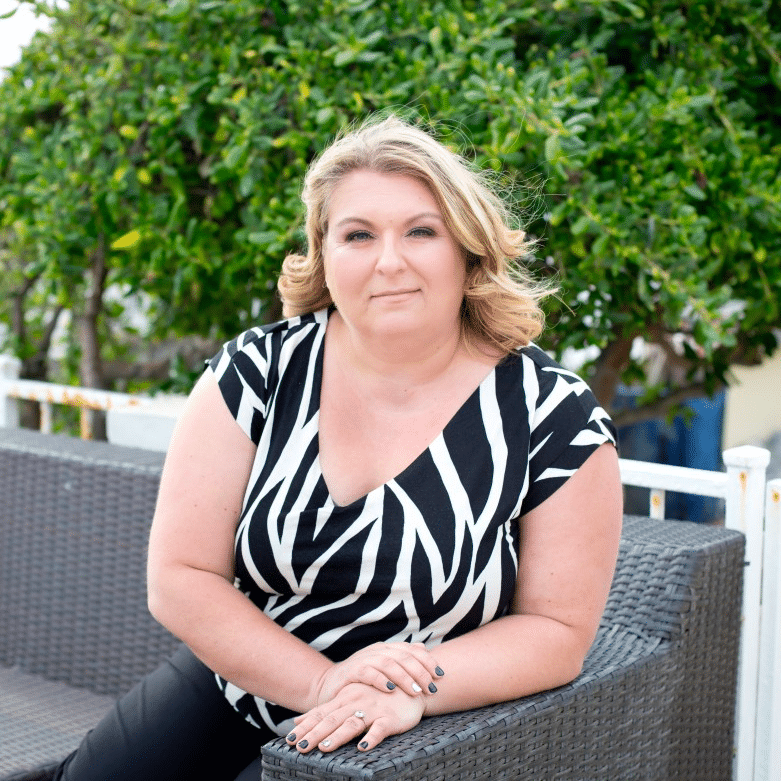
Author
During his time as VP, Business Development at TUNE, Nate spearheaded the Affiliate Rockstars series, which aims to highlight the hard-working individuals in the industry and share their expertise with a wider audience. Nate received his BA in Social Sciences from Washington State University.

